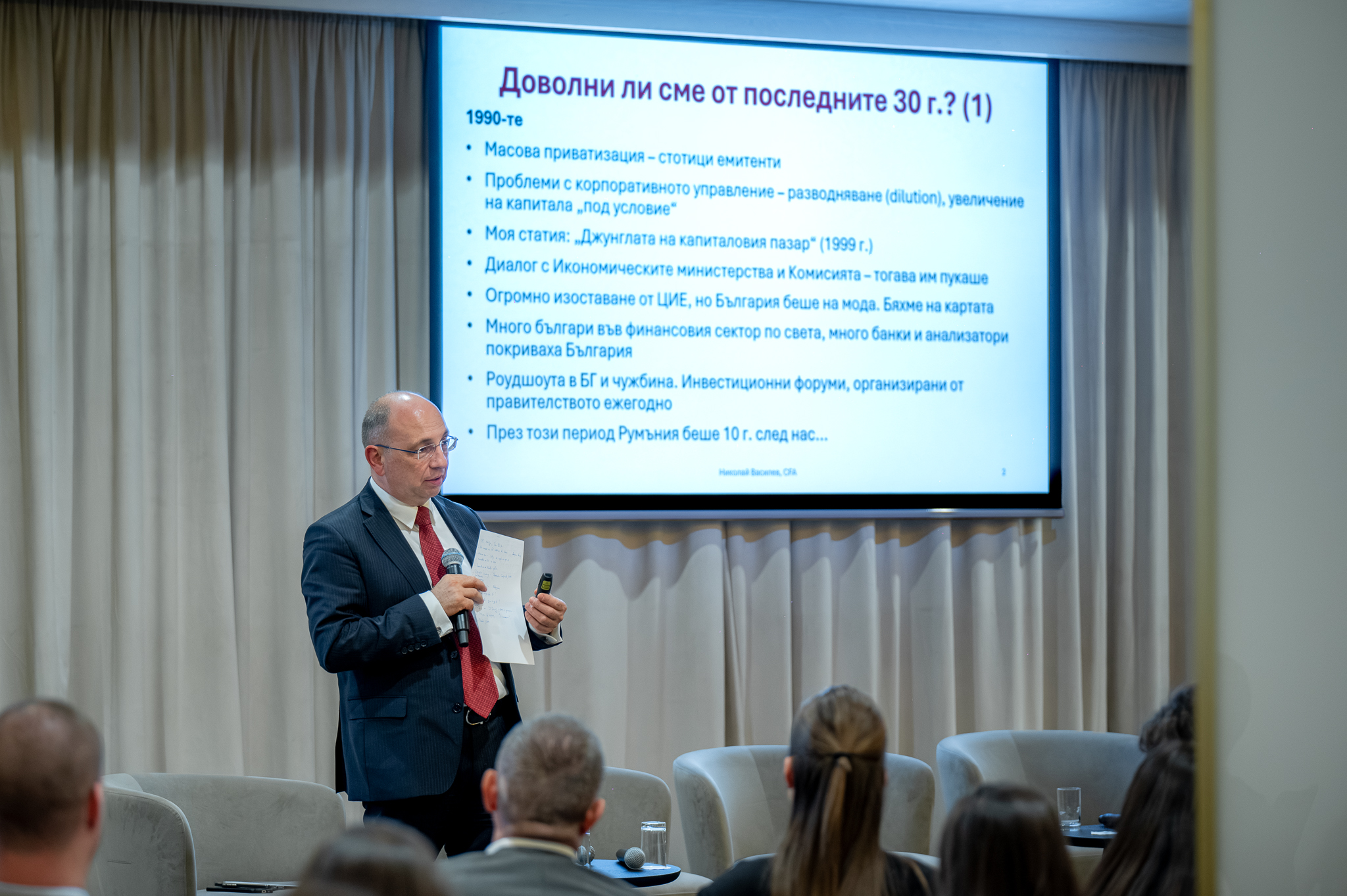Without structured reforms and strategic decision-making, Bulgaria’s capital markets will continue to struggle to reach their full potential and support a competitive economy. This was the focus of the conference "Why are capital markets in Bulgaria not thriving?", organized by the Bulgarian CFA Association. The event took place on November 11, 2025, from 6:30 p.m. to 9:45 p.m. at the Intercontinental Sofia Hotel and brought together more than 300 participants – professionals from the financial sector, representatives of state institutions, investors, and industry experts. Although the official program concluded at 9:45 p.m., discussions continued after the end, reflecting both the significance of the topic and the strong interest and engagement of the audience.
The event opened with remarks from Nikolay Vassilev, CFA, Chairman of the Board of Directors of the Bulgarian CFA Association. The evening’s host was Ivaylo Penev, CFA, Executive Director of Elana Fund Management. At the outset, special awards for overall contribution to the development of Bulgaria’s capital markets were presented to Apostol Apostolov, Chairman of the Supervisory Board of Texim Bank; Kamen Kolchev, Chairman of the Management Board of Elana; Vasil Golemanski, Chairman of the Financial Supervision Commission; and Stanimir Karolev, founder of Karol Finance. The recognitions honored their longstanding efforts and significant influence on the sector.
The first panel focused on the vision of the leading figures – the “gurus” – of the Bulgarian capital market. It featured Apostol Apostolov; Kamen Kolchev; Angel Rabadzhijski, CEO of Karol; Nikola Yankov, Managing Partner at Expat Capital; Svetla Nestorova, Executive Director of POK “Doverie”; and Anton Panayotov, CEO of Alaric Securities. The speakers examined the long-standing structural barriers to market development, including the limited number of public companies and the low participation of individual investors. The panel was moderated by Lyubomir Boyadzhiev from Benchmark Finance.
The second panel offered an institutional lens on the challenges facing Bulgaria’s capital markets. It featured Delian Dobrev, Chairman of the Budget and Finance Committee in the National Assembly; Vasil Golemanski, Chairman of the Financial Supervision Commission; and Manyu Moravenov, Executive Director of the Bulgarian Stock Exchange. The discussion was moderated by Desislava Boneva, CFA, Member of the Board of Directors of the Bulgarian CFA Association. The panellists underscored the need for a stable and predictable regulatory framework, a more consistent and supportive business environment, and stronger coordination among state institutions – conditions they identified as essential for sustainable market development.
The third panel was dedicated to female CFA charterholders and their role in shaping the future of the financial industry in Bulgaria. The discussion featured Tatiana Puncheva, CFA, member of the Board of Directors of Elana Trading; Julia Katsarova, CFA, Senior
Portfolio Manager at Expat Asset Management; Diana Aladzova, CFA, Partner at Silverline Capital; and Liliyana Marinova, CFA, Vice President at FactSet. The conversation was moderated by Krasimira Kodzhamanova, CFA, Executive Director at Select Asset Management. The panel emphasized that if Bulgaria aims to accelerate – and even multiply tenfold – the potential of its capital market, the country must channel the rising public interest in themes such as artificial intelligence and gold into meaningful participation in the stock market. It must also speed up cloud transformation, foster the development of AI-driven investment products, and expand both discretionary mandates and the involvement of foreign investors.
The closing presentation, focusing on “What Is Bulgaria Still Lacking to Become a Leader in the Capital Markets?”, was delivered by Nikolay Vassilev, CFA, Chairman of the Board of Directors of the Bulgarian CFA Association. Vassilev traced the thirty-year trajectory of Bulgaria’s capital market – from its “golden age,” marked by record SOFIX growth, to the subsequent stagnation that ultimately led to the country’s removal from the list of frontier markets. He argued that the underlying issues are systemic: the absence of a clear vision and coherent state strategy, a limited number of listings, chronically low liquidity, and a regulator that lacks sufficient professional capacity. Vassilev outlined concrete measures to reverse this trend, including the privatization of the stock exchange and the central depository, state-led listings, and a large-scale public awareness campaign promoting more than 100 Bulgarian companies – steps that, in his view, could restore Bulgaria’s presence on the regional investment map.













